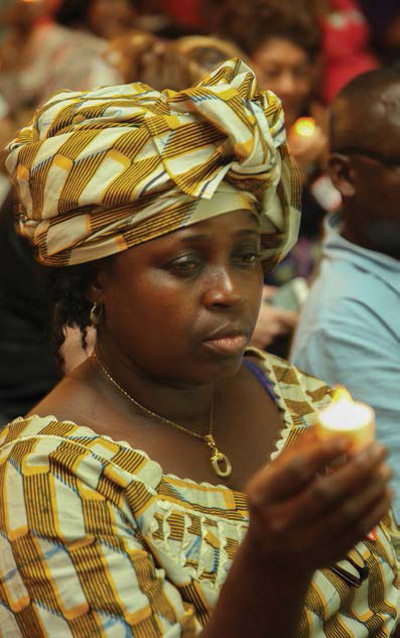Ebola: Organize, Protect Workers and Prevent the Next Epidemic
August 12, 2015
1199 hosts West African trade unionists who are fighting for life-saving changes to their healthcare system.
1199SEIU hosted trade unionists from West Africa to discuss the response to Ebola there. Home health aide Mercy Karne, originally from Liberia, was among the more than 200 members and guests who attended the July 8 event.
Ebola is not a natural disaster.
Ebola is a political problem.
Dr. Jasper Goss, Wendy Verheyden and Ayuba Wabba— trade unionists from West Africa—delivered this message on July 8 during a panel discussion hosted at the Union’s Manhattan’s headquarters. Moderated by SEIU’s Dr. Toni Lewis, the discussion centered on how the virus devastated West Africa’s most fragile countries, the effects on healthcare workers and how they are rebuilding their countries, their lives and continuing as caregivers.
“This was a wonderful event,” said Elijah Jarboe, a dietary worker at Bronx Lebanon Hospital who came to the U.S. from Liberia 31 years ago. “I got up at a delegate assembly one night to appeal to our brothers and sisters to join the fight against Ebola, so to see this happening feels great.”
Goss and Verheyden are representatives of Public Services International (PSI), a 20-million member global trade union federation that includes 1199’s parent, the Service Employees International Union. Wabba is President of the Nigeria Labour Congress and has led numerous labor organizations in Nigeria. They were in New York City to attend the International Ebola Recovery Conference at the United Nations, which was convened by Secy. Gen. Ban Ki-moon to ensure recovery efforts in West Africa address improved rebuilding and greater resilience for the region’s healthcare systems. Goss, Wabba, Verheyden and others were at the U.N.
Conference to lobby on behalf of public health system reinforcement in West Africa and to give voice to workers’ rights issues and long-term change. These must be addressed if the region is to effectively face another health disaster, they say. “Ebola started in Guinea in 2014 and because of the transnational nature of the outbreak it very quickly spread to Liberia, Sierra Leone, Mali and Nigeria,” said Wabba. “To date there are 26,000 recorded cases with more than 10,000 deaths. A sizable number are health workers of all professions—doctors, nurses, medical laboratory scientists and cleaners have all been affected.” The panelists shared stories of Ebola overwhelming frontline caregivers, largely in poor, rural areas. Workers were without proper or any supplies and facilities. Funding streams that could have helped were diverted elsewhere or hindered by tangles of bureaucracy—often with no specific explanation of how or where money was being spent. Funds budgeted to aid caregivers, in too many cases didn’t make it to them. Healthcare workers often went without pay for months while treating Ebola patients. Other caregivers died from the virus, leaving behind orphaned children or destitute families. As long as all of this was going on within Africa’s borders the world’s developed nations looked away.
"The World Health Organization reported 5% of all Ebola deaths were among health workers."
“For the world to address Ebola it had to get to a point where it was a global crisis,” said Goss. “It had to get to the point where Europe was going to face a crisis, where North America was going to face a crisis.”
The fight now is to ensure the availability of personal protective equipment, safe working conditions, a strong infrastructure and availability of resources to deal with infectious disease. Workers also need social and economic security for themselves and their families. Organizing and unions have a direct impact on the quality of care, and can by extension influence outcomes in national and global health crises.
“A lot of the countries [that were effected by Ebola] are not allowed to be unionized,” said Wabba. “And it is in those countries where we saw the worst case scenarios.”
In Guinea, Sierra Leone and Liberia, where unions are weak (in Liberia it is against the law for public health workers to unionize ) the World Health Organization reported 5% of all Ebola deaths were among health workers.
“We have to stress the importance of organizing in these challenging conditions,” said Wendy Verheyden. “We can lend our voice to the right to belong to a union. It is a basic right.” She also stressed the importance of building solidarity through social media, collecting workers’ stories and getting them out on a global scale.
“People don’t just need help now. They will need help well into the future,” says 1199 member Elijah Jarboe. “Liberia was in civil war for years. I went home and took my mother to the hospital. They have nothing. There are no drugs. They treat patients with bare hands. This is not just about Ebola, but about stopping all kinds of life-threatening disease.”


